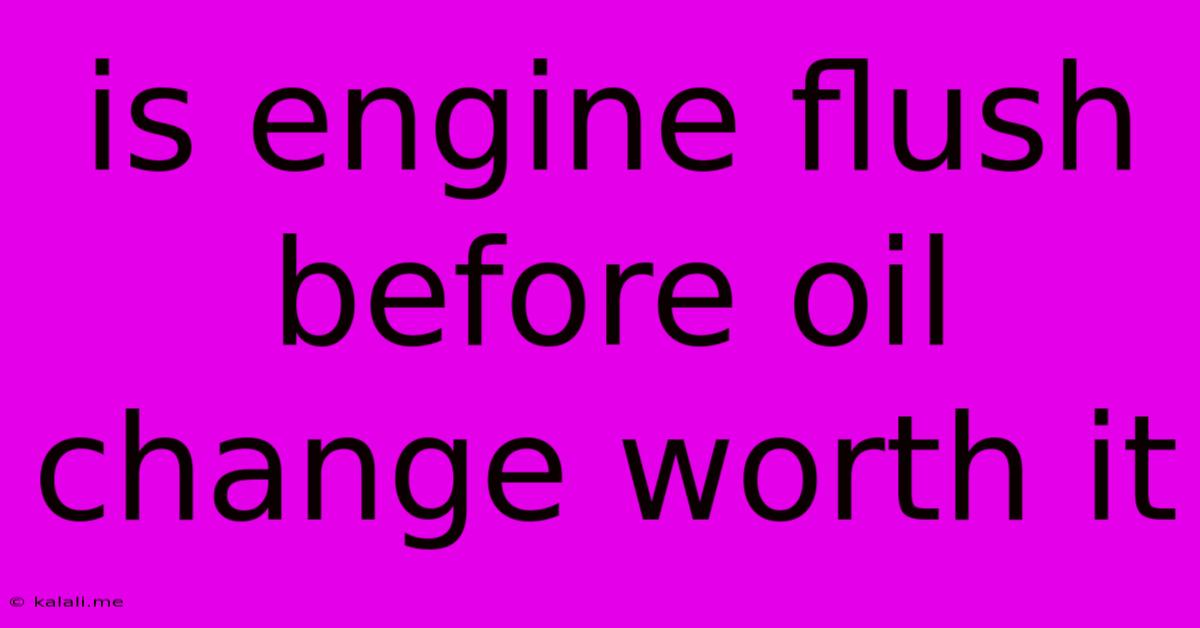Is Engine Flush Before Oil Change Worth It
Kalali
Jun 02, 2025 · 3 min read

Table of Contents
Is Engine Flush Before Oil Change Worth It? A Deep Dive into the Debate
Meta Description: Should you flush your engine before an oil change? This article explores the pros and cons of engine flushes, helping you decide if this pre-oil change treatment is worthwhile for your vehicle. We examine the potential benefits, risks, and cost-effectiveness.
The question of whether an engine flush before an oil change is necessary is a hotly debated topic among car owners. While some swear by its benefits, others consider it unnecessary and potentially harmful. This article delves into the heart of the matter, weighing the pros and cons to help you make an informed decision for your vehicle.
Understanding Engine Flushes
An engine flush is a chemical treatment designed to remove sludge, varnish, and other deposits from your engine's internal components. These deposits can accumulate over time, reducing engine efficiency and potentially causing damage. Engine flushes typically involve adding a specialized fluid to your engine oil, allowing it to circulate and dissolve the contaminants before draining it along with the old oil.
The Arguments For Engine Flushes
Proponents of engine flushes claim several benefits:
- Improved Engine Performance: By removing built-up deposits, an engine flush can supposedly restore engine performance, leading to smoother operation and potentially improved fuel economy. This is especially touted for older vehicles or those with a history of infrequent oil changes.
- Extended Engine Life: Reducing sludge and varnish can protect engine components from wear and tear, theoretically extending the engine's lifespan.
- Cleaner Oil: A flushed engine will supposedly start with cleaner oil, ensuring optimal lubrication from the very beginning of the new oil cycle.
The Arguments Against Engine Flushes
Conversely, there are significant arguments against the use of engine flushes:
- Potential for Damage: The aggressive cleaning action of some engine flushes can dislodge larger deposits, which could potentially clog oil passages or damage sensitive engine components. This is a major concern, particularly for older engines with already worn parts.
- Unnecessary for Regularly Maintained Engines: For vehicles that receive regular oil changes using high-quality oil and filters, the accumulation of significant deposits is unlikely. A standard oil change is usually sufficient.
- Voiding Warranty: In some cases, using an engine flush might void your vehicle's warranty, depending on the manufacturer's stipulations. Always check your warranty documentation.
- Cost Ineffectiveness: Considering the potential risks and the fact that regular maintenance often negates the need, the cost of an engine flush might not be justified.
The Verdict: When is an Engine Flush Justified?
The decision of whether or not to use an engine flush is highly contextual. For vehicles with a history of neglected maintenance, showing signs of sludge buildup (e.g., noisy operation, reduced performance), an engine flush might be considered, but only after careful consultation with a trusted mechanic. However, even then, the potential risks should be carefully weighed against the benefits. For vehicles that receive regular oil changes with quality oil and filters, an engine flush is generally unnecessary and potentially detrimental. A simple oil change with a new filter is usually sufficient to maintain optimal engine health.
Alternatives to Engine Flushes
Instead of relying on an engine flush, focusing on preventive maintenance is far more effective. This includes:
- Regular Oil Changes: Sticking to the recommended oil change intervals specified in your vehicle's owner's manual is crucial.
- Using High-Quality Oil and Filters: Investing in premium oil and filters provides superior protection against sludge and varnish buildup.
- Addressing Leaks Promptly: Fixing oil leaks promptly prevents oil loss and maintains proper lubrication.
Ultimately, the best approach is to prioritize regular, preventative maintenance. This generally renders the need for an engine flush obsolete and minimizes the risks associated with it. Consult your mechanic if you have concerns about your engine's health; they can offer a personalized assessment and recommend the appropriate course of action.
Latest Posts
Latest Posts
-
How To Feed As A Vampire In Skyrim
Jun 04, 2025
-
Number Of Iphone Picture Is Different On Pc
Jun 04, 2025
-
Civ 6 Manage Citizens Not Showing Swap
Jun 04, 2025
-
What Day Will It Be In 100 Days
Jun 04, 2025
-
Plumbing Two Sinks Into One Drain
Jun 04, 2025
Related Post
Thank you for visiting our website which covers about Is Engine Flush Before Oil Change Worth It . We hope the information provided has been useful to you. Feel free to contact us if you have any questions or need further assistance. See you next time and don't miss to bookmark.